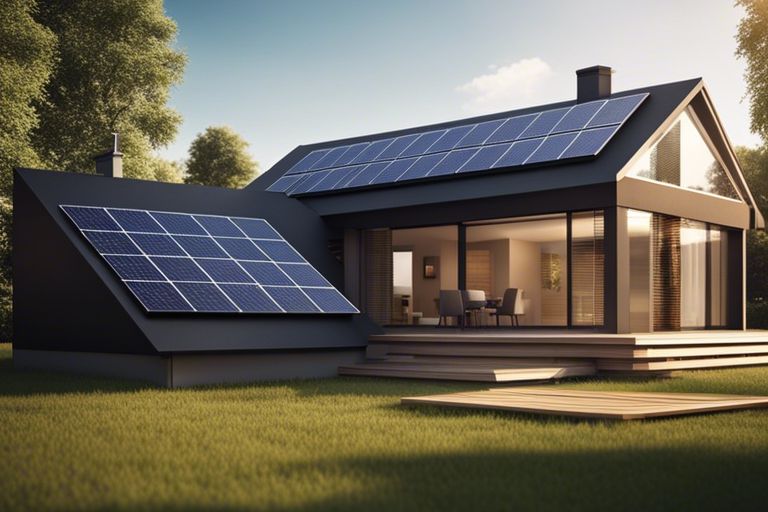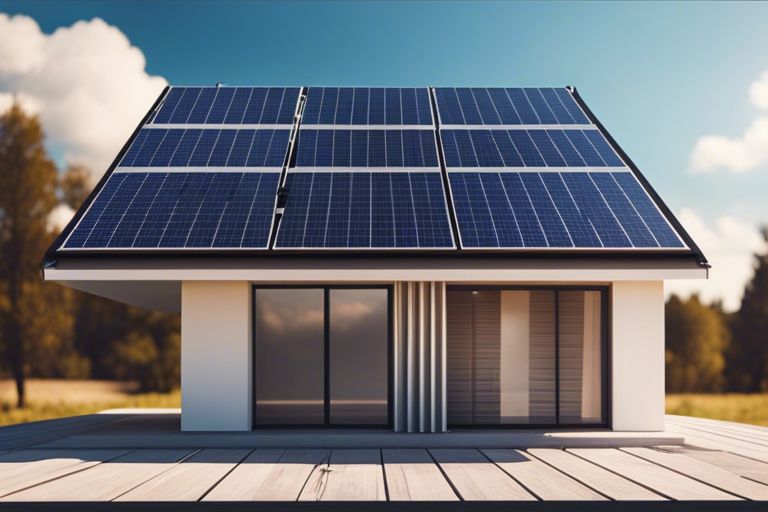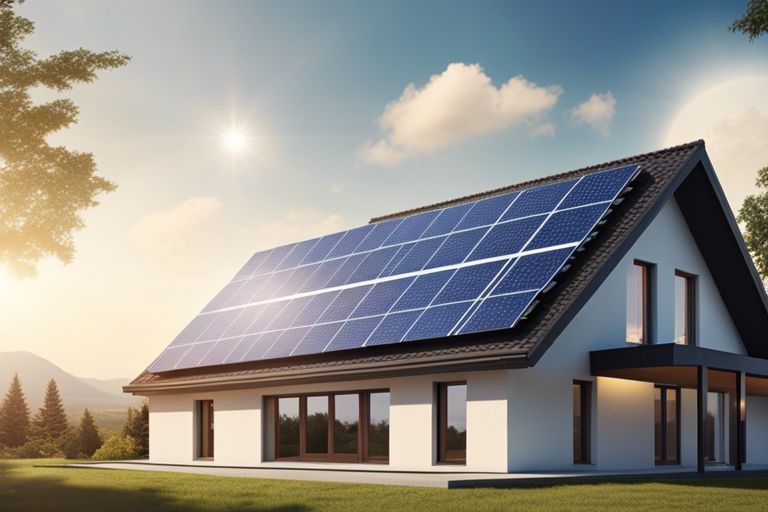It’s a common question many homeowners ask: can you use solar power to meet your household energy needs? The answer lies in understanding your energy consumption patterns and the capacity of a solar energy system to power your entire house. To probe deeper into this topic and learn more about whether you can run your whole house on solar power, check out Can I Run My Whole House on Solar Power? for insightful information.
Key Takeaways:
- Solar panels can be used to power your house by converting sunlight into electricity.
- Solar power is a sustainable and renewable energy source that can help reduce your electricity bills and carbon footprint.
- Net metering allows you to sell excess solar power back to the grid, providing potential cost savings.
- Battery storage systems can store excess solar energy for use during times when the sun is not shining, increasing self-sufficiency.
- Consult with a professional to assess your energy needs, calculate the optimal system size, and ensure proper installation for maximum efficiency.

Benefits of Solar Power
While What is required to connect solar panels to my home without connecting to the grid? might sound like a daunting question, the benefits of solar power make it a worthwhile investment for your home.
Environmental Advantages
For environmentally conscious individuals like yourself, solar power offers a clean and sustainable energy solution. By harnessing the power of the sun, you reduce your carbon footprint and lower greenhouse gas emissions, helping combat climate change. Solar energy also reduces dependence on finite fossil fuels, promoting a more sustainable energy future for generations to come.
Cost-Effective Energy Solution
For those looking to save on energy bills, solar power presents a cost-effective solution. By generating your own electricity, you can significantly reduce your monthly utility costs. Additionally, many governments offer incentives such as tax credits and rebates for installing solar panels, making the initial investment more affordable. Over time, solar power can even increase the value of your home, providing long-term financial benefits.
Apart from the financial savings, installing solar panels can also protect you from fluctuating energy prices in the future. As traditional energy costs continue to rise, your solar panels will provide you with a stable and predictable energy source, giving you more control over your expenses.
Assessing Your Home’s Solar Potential
Evaluating Your Roof’s Solar Readiness
To determine if your roof is suitable for solar panels, you need to consider its orientation, shading, and condition. Assuming you have a south-facing roof with minimal shading from trees or other structures, you are off to a good start. Ideally, your roof should have enough space for the panels and be in good condition to support the installation.
Considering Your Energy Consumption
On top of assessing your roof’s solar readiness, you should also evaluate your energy consumption to determine the size of the solar system you will need. To better understand your energy usage, take a look at your utility bills to see how much electricity you typically consume. By knowing your energy consumption patterns, you can size your solar system accordingly to cover a significant portion of your electricity needs.
Consumption habits and energy-efficient upgrades in your home can also impact the size and effectiveness of the solar system you require. By identifying areas where you can reduce energy waste and improve efficiency, you can optimize your solar power setup and maximize its benefits for your household.
Types of Solar Panels
Despite the growing popularity of solar energy, not all solar panels are created equal. Different types of solar panels have their own unique characteristics and advantages. Here are the main types of solar panels you may encounter:
| Monocrystalline Silicon Panels | Polycrystalline Silicon Panels |
| Thin-Film Solar Panels |
Monocrystalline Silicon Panels
On the market, you will find monocrystalline silicon panels, which are known for their high efficiency and sleek black appearance. These panels are made from a single continuous crystal structure, making them more space-efficient compared to other types. Monocrystalline panels are an excellent choice if you have limited roof space but want to maximize your solar energy production.
On the flip side, monocrystalline silicon panels tend to be more expensive than other options. However, the higher efficiency and longer lifespan they offer can often make up for the initial investment in the long run.
Polycrystalline Silicon Panels
The polycrystalline silicon panels are another popular choice for residential solar installations. These panels are made from multiple silicon crystals, which give them a speckled blue appearance. Polycrystalline panels are generally more affordable than monocrystalline panels, making them a budget-friendly option for homeowners looking to harness solar power.
The efficiency of polycrystalline silicon panels is slightly lower than monocrystalline panels, meaning you may need more roof space to generate the same amount of electricity. However, advancements in technology have improved the efficiency of polycrystalline panels in recent years, making them a competitive choice for many households.
Thin-Film Solar Panels
Types of thin-film solar panels, including amorphous silicon, cadmium telluride, and copper indium gallium selenide (CIGS), offer a flexible and lightweight alternative to traditional silicon panels. These panels are easier to install and can be integrated into various surfaces, such as roofs and walls, providing more design flexibility for your solar system.
On the downside, thin-film solar panels typically have lower efficiency rates compared to crystalline silicon panels. This means you may need a larger installation area to generate the same amount of electricity. However, their versatility and lower cost can make them a practical choice for certain applications.
System Components and Installation
Inverters and Mounting Systems
After you have decided to power your house with solar energy, it’s important to understand the components that make up a solar system. Inverters are crucial as they convert the direct current (DC) produced by the solar panels into alternating current (AC) that can be used to power your home. Mounting systems are also imperative to securely install the solar panels on your roof or in your yard to maximize sun exposure.
Battery Storage Options
After you have your solar panels set up, you may want to consider adding a battery storage system to store excess energy produced during the day for use at night or during cloudy days. Battery storage options vary depending on your energy needs and budget, with popular choices including lithium-ion batteries and lead-acid batteries.
For instance, lithium-ion batteries are more expensive but provide longer lifespan and higher energy density compared to lead-acid batteries. It’s important to assess your energy consumption patterns and choose the right battery storage option that best suits your needs.
Installation Process and Timeline
Storage installation involves mounting the batteries in a safe and accessible location, usually indoors or in a well-ventilated enclosure. The installation process includes connecting the batteries to the solar system and ensuring they are properly set up to store and discharge energy efficiently.
Timeline for installing a solar system typically ranges from a few days to a few weeks, depending on the complexity of the system and any necessary permits or inspections. Make sure to work with a reputable solar installation company that can guide you through the process and provide a clear timeline for installation.

Financial Considerations
Once again, when considering using solar power to run your house, there are several financial factors to take into account. By understanding the initial investment, government incentives, tax credits, and available financing options, you can make a well-informed decision on whether solar power is a viable option for you.
Initial Investment and Payback Period
An important factor to consider when thinking about using solar power for your home is the initial investment required and the payback period. While the upfront cost of installing solar panels can be significant, it is necessary to note that over time, you can save money on your electricity bills and even earn credits for excess energy produced. By calculating your potential savings and payback period, you can determine if investing in solar power is financially beneficial in the long run.
Government Incentives and Tax Credits
Considerations should also be given to the various government incentives and tax credits available for installing solar panels on your property. These incentives can significantly reduce the overall cost of your solar power system, making it more affordable and enticing for homeowners to make the switch to renewable energy. Make sure to research the specific incentives and credits available in your area to take full advantage of these financial benefits.
Initial costs can be daunting, but when you incorporate government incentives and tax credits, the overall investment becomes more manageable and cost-effective. It’s necessary to understand the eligibility criteria and application process for these incentives to maximize your savings and reduce the financial burden of installing a solar power system.
Financing Options and Loans
The availability of various financing options and loans can also make solar power more accessible to homeowners. Whether through solar loans, leasing programs, or power purchase agreements, there are alternative ways to fund your solar panel installation without a significant upfront payment. The flexibility of these financing options allows you to choose the best financial solution that fits your budget and energy needs.
This makes it easier for you to afford solar power for your home without stressing about the initial investment. By exploring different financing options and loans, you can find the most suitable arrangement that works for you and allows you to enjoy the benefits of solar energy sooner rather than later.

Maintenance and Monitoring
All solar panel systems require regular maintenance to ensure they are operating at peak efficiency. This includes cleaning and inspection schedules to keep your system running smoothly.
Cleaning and Inspection Schedules
With solar panels, it is imperative to keep them clean to maximize their energy production. You should establish a regular cleaning schedule to remove any dirt, debris, or snow that may accumulate on the panels. Additionally, scheduling annual inspections by a professional can help identify any issues early on and prevent more significant problems down the line.
Performance Monitoring and Troubleshooting
Troubleshooting any performance issues with your solar panel system is crucial to ensure it is generating the energy you need. Regularly monitoring its performance can help you identify any dips in production and troubleshoot any potential problems promptly.
Troubleshooting performance issues can involve checking the inverter, inspecting the wiring, or assessing the panels themselves. If you notice a significant decrease in energy production, it may be time to call in a professional to diagnose and fix the issue.
To ensure your solar panel system is running efficiently, you should consider investing in a monitoring system that allows you to track its performance in real-time. This can help you stay on top of any issues that may arise and address them promptly.
Warranty and Support Options
To protect your investment in solar power, it’s imperative to understand the warranty and support options available to you. Many solar panel manufacturers offer warranties on their products, covering any potential defects or issues that may arise.
An extended warranty or service agreement can provide you with additional peace of mind knowing that your system is covered for a longer period. Be sure to explore all the warranty and support options available to you when purchasing a solar panel system.
Understanding your warranty and support options can help you navigate any issues that may arise with your solar panel system. Make sure to review the terms and conditions of your warranty carefully and take advantage of any support services offered to you.
Final Words
So, can you use solar to power your house? The answer is a resounding yes. With advancements in technology and decreasing costs, solar power has become a viable and sustainable option for homeowners looking to reduce their carbon footprint and save on energy bills. By installing solar panels on your roof, you can harness the power of the sun to generate clean electricity for your home.
Not only will you be contributing to a greener environment by using solar energy, but you will also enjoy the benefits of lower energy costs and increased energy independence. So why wait? Consider switching to solar power for your home and start enjoying the many advantages it has to offer.
FAQ
Q: Can I use solar panels to power my house?
A: Yes, you can use solar panels to power your house. By installing solar panels on your roof or property, you can generate electricity from the sun’s rays to power your home’s appliances and lighting.
Q: How much does it cost to install solar panels for a house?
A: The cost of installing solar panels for a house can vary depending on the size of the system, the type of panels, and the location of your home. On average, a typical residential solar panel system can cost between $15,000 to $25,000 before any tax credits or incentives.
Q: Are there any incentives or rebates available for installing solar panels on my house?
A: Yes, there are various incentives and rebates available for installing solar panels on your house. These include federal tax credits, state and local rebates, and utility incentives. These financial incentives can help reduce the upfront cost of installing a solar panel system for your home.
